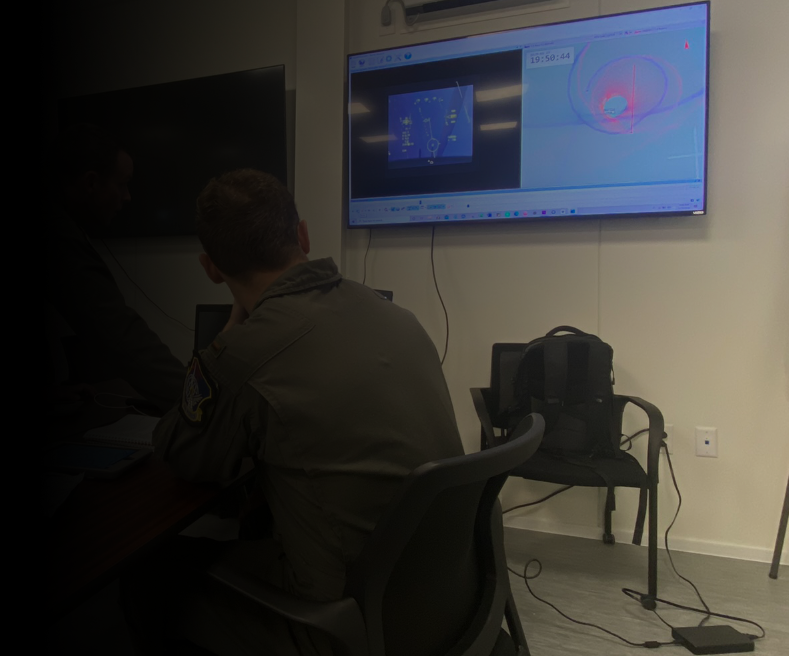4-Ship Formation Success
Achieving Consistent Graduate-Level 4-Ship Formation Performance on First Sortie Through Integrated Academic and VR Training

Challenge
In our Pilot Training Next (PTN) syllabus, we introduced 4-ship formation training to students who had previously only been exposed to basic formation maneuvers in the T6 syllabus. The primary challenge was that students relied solely on textbook publications and academic materials, lacking practical visual and auditory references necessary for mastering 4-ship maneuvers. This gap resulted in sorties filled with errors, as students struggled to translate theoretical knowledge into real-world execution.
Solution
We enhanced our academic curriculum by integrating 4-ship simulator recordings and ACMI data into our learning materials. This provided students with a comprehensive understanding of what 4-ship maneuvers looked and felt like, including pacing, radio communications, and real-time decision-making cues. Additionally, we incorporated VR-based sortie rehearsals to allow students to practice and refine their skills in a controlled, immersive environment.
During VR sessions, instructors conducted real-time debriefs, pausing simulations to discuss and analyze student performance. We also recorded ACMI lines from these sessions, offering students a first-person view of their maneuvers and their positioning relative to other aircraft. This dual approach of visual and experiential learning enabled students to immediately apply feedback and improve their techniques.

Advancing Performance
Enhanced Curriculum
Integrated 4-ship simulator recordings and ACMI data into learning materials for comprehensive understanding.
VR Integration
Incorporated VR-based sortie rehearsals with real-time instructor feedback and analysis.
Real-Time Debriefs
Conducted immediate feedback sessions with pause capability for detailed analysis.

Detailed Results
Consistent Graduate-Level Performance on First Sortie
Every student who flew a 4-ship sortie demonstrated consistent graduate-level proficiency on their very first attempt—an achievement unparalleled in other training pipelines. When transitioning from simulator-based training to actual flight, students exhibited seamless execution without the struggles they faced in the simulators.
Overcoming Information Processing Challenges
In the simulators, students initially struggled with where to take in information, how to process it, and how to make decisions based on that information. They also had difficulties with controlling the aircraft within a 4-ship formation. Through targeted VR training and real-time debriefs, these challenges were addressed effectively.
Seamless Transition from Simulator to Flight
The simulators served as knowledge-building tools, helping students understand the nuances of 4-ship maneuvers. By the time they executed their first actual sortie, students had internalized the necessary cues and decision-making processes, enabling them to perform flawlessly.
Enhanced Situational Awareness and Contingency Management
In a critical scenario where an aircraft was out of position during the first 4-ship flight, a student successfully utilized a contingency tool for the first time. This tool enabled the student to mitigate the situation effectively, demonstrating the practical value of our integrated training approach.
Rapid Skill Acquisition
Within the timeframe of a single sortie, students transitioned from struggling with basic 4-ship maneuvers to executing them flawlessly. This accelerated learning curve significantly reduced the time needed to achieve proficiency.
Comprehensive Understanding of Cues
Students learned to take in information during 4-ship formations, understand what that information meant, decide on appropriate actions, and execute those actions correctly. This holistic understanding was built through the appropriate use of simulators and VR tools.
Summary
By seamlessly integrating academic content with advanced simulation and VR technologies, we created a robust training environment that not only accelerated student learning but also enhanced overall training quality and safety. This approach ensured that students could apply their simulator training effectively in real-world sorties, achieving exceptional performance from their very first 4-ship formation flight.
First-Time Excellence

Consistent graduate-level performance on initial 4-ship sorties.
Information Processing

Mastery of complex information intake and decision-making.
Seamless Transition

Smooth transfer from simulator to actual flight performance.
Safety Enhancement

Improved contingency management and safety awareness.
